Imagine the satisfaction of taking your freshly washed laundry out of the washing machine, only to be greeted by a foul odor. The pleasant experience of clean, fresh laundry is ruined, and you’re left wondering what went wrong.
Washing machines- especially front load washing machines- can grow bacteria inside the machine, filter and around the washer gasket. But don’t worry, we’ve got the solutions to help you learn how to get rid of smell in washing machine and keep it fresh.
In this blog post, we will explore the main causes of washing machine smells, the steps to eliminate them, and preventative measures to maintain a fresh-smelling laundry machine. So, let’s dive in and tackle those pesky odors with our guide on how to get rid of smell in washing machine!
How to Get Rid of Smell In Washing Machine Key Takeaways
- Remove and clean all the soap, bleach, and fabric softener dispensers. Check the gaskets to make sure nothing is trapped in there.
- Run a hot water cycle with 2 cups of white vinegar to top loaders and 4 cups to front loaders of white vinegar to your washing machine.
- Always use the correct amount of detergent usage and remember to regularly clean your washing machine.
- Use alternative solutions for stubborn odors such as Affresh washing cleaner or bleach treatment followed up with two rinse cycles.
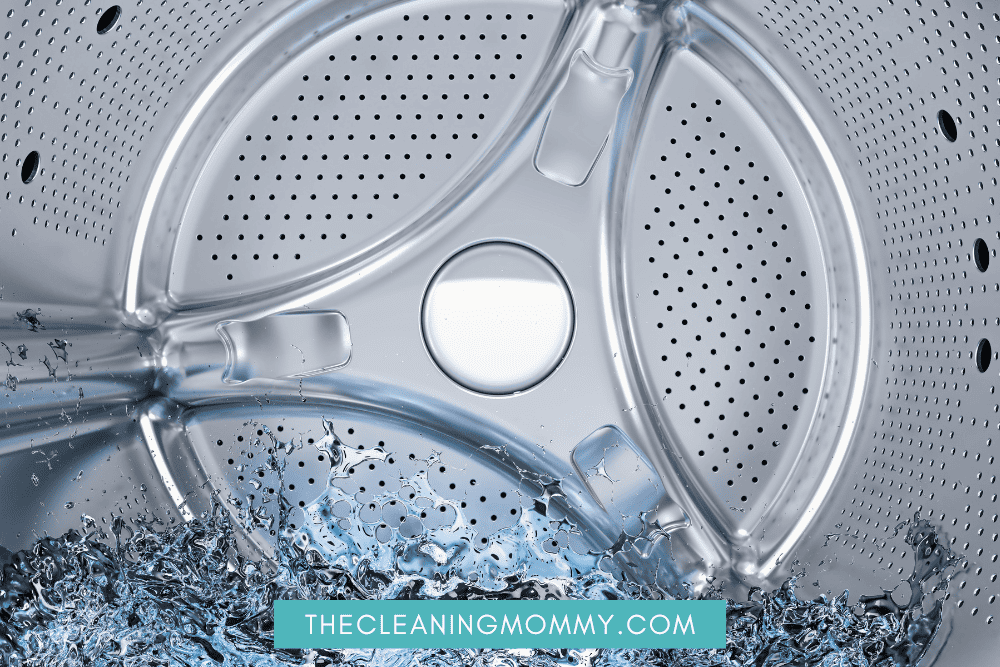
Steps to Eliminate Washing Machine Odors
So your washing machine stinks and you’re looking for the best way to remove the bad smells and get your washing machine back to smelling fresh again, and back to doing its job!
Let’s get your stinky washing machine back on track and with this three-step cleaning process that includes cleaning dispensers, running a hot vinegar cycle, and scrubbing the drum and seal.
Step 1: Empty and clean detergent dispenser
The first step in eliminating odors from your washing machine is to:
- Remove and clean all the soap, bleach, and fabric softener dispensers. Residue buildup in your machine’s detergent container can contribute to a smelly washer and hinder the performance of your washer.
- Ensure that you also pay attention to your washers rubber gaskets in front-load models, as dirt and debris can accumulate in your front loading washers in this area.
- For top load washers, clean around the door and hinges, removing any dirt that may go unnoticed.
Once the washer’s detergent dispenser is emptied, use a damp cloth or a cleaning solution to wipe them down thoroughly. If necessary, use a pipe cleaner to reach into tight spaces and remove any debris.
Make sure to regularly clean these these dispensers, doing so will stop any nasty smells getting into your washing machine. Give it a quick wipe down every month, maybe do it at the same time you do a deep cleaning on yoru washing machine
Step 2: Run a hot cycle with vinegar
I will assume by now that you own a large bottle of distilled white vinegar, you certainly will do if you have been around me long enough!
Vinegar has so many uses in the home, it amazes me with everything that it does!
The next step in eliminating washing machine odors is to run a hot cycle with vinegar. Vinegar is an excellent natural sanitizer and deodorizer that can help remove stubborn smells from your machine.
Here’s what you need to do:
- Add 2 cups of white vinegar to top loaders and 4 cups to front loaders of white vinegar to your washing machine.
- Initiate the hot cycle.
- Let the vinegar wash run its course. This vinegar wash should help kill any mold and mildew present in your washer, as well as dissolve any detergent buildup.
Upon completion of the hot vinegar cycle, running a rinse cycle is crucial to remove all vinegar traces from your washing machine. The remaining vinegar smell will dissipate once the rinse cycle is finished, leaving your machine smelling fresh and clean.
Step 3: Scrub the Drum and Seal
After running a hot normal cycle with vinegar, the final step to eliminate washing machine odors is to scrub the washer drum and rubber seal (front load model) with a vinegar and water solution and a soft cloth.
This will help remove any remaining dirt, grime, and mold that can accumulate over time, contributing to unpleasant smells. Scrubbing the drum and seal also helps maintain the performance and efficiency of your washing machine.
Once you’ve finished scrubbing, rinse the drum and seal with clean water to remove smells and any remaining cleaning solution. Your washing machine should now be free of any unpleasant odors and ready for your next load of laundry.
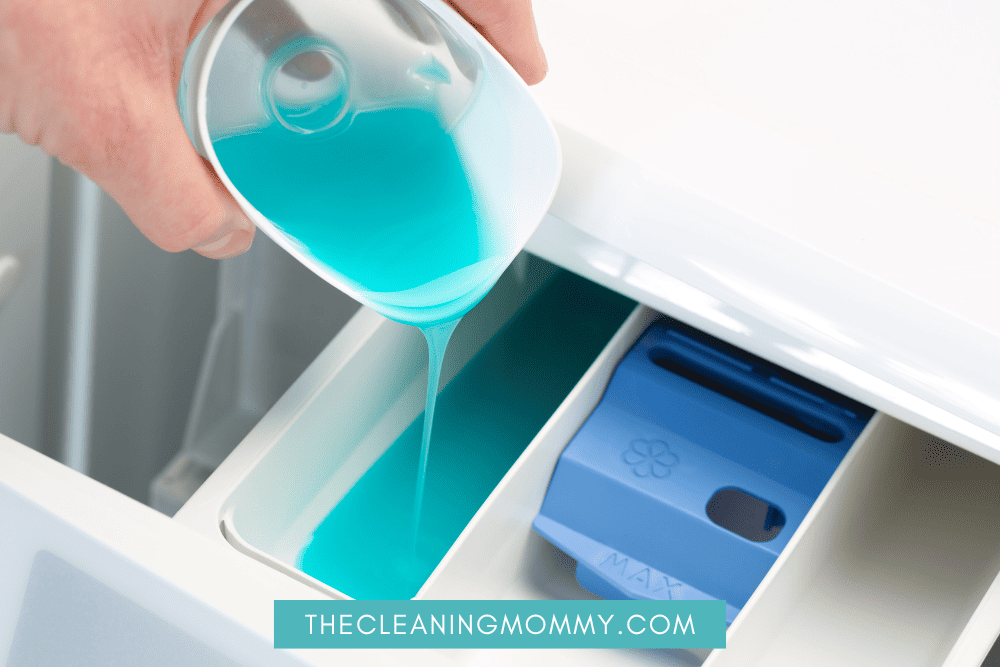
Identifying the Cause of Washing Machine Smells
So, how can you stop these washing machine smells from occuring. Well, pinpointing the root cause is an effective strategy to stopping washing machine smells. Three main factors contribute to unpleasant smells in your machine: mold and mildew, detergent buildup, and trapped debris.
Each of these issues can give you that awful smelly washer smell!
Let’s take a look at each one in greater depth.
Mold and mildew
Mold and mildew are types of fungi that thrive in damp, dark environments like washing machines, especially a front-loader. The rubber door gasket, designed to prevent water leakage in front-load washers, is particularly susceptible to trapping dirt, soap scum, and other debris, providing an ideal breeding ground for mold and mildew.
As a result, you have yourself a smelly washer that’s difficult to ignore.
Regular cleaning of your washing machine and using the correct detergent amount can easily prevent mold and mildew growth.
Washing machines need to be aired out after each use to stop mold growth. so always keep you washing machine door open between washes to let excess moisture evaporate and prevent mildew growth. This works for your dryer too.
Detergent Buildup
Another common cause of washing machine smells is detergent buildup. When the detergent isn’t thoroughly rinsed out of clothing, it can leave behind a residue that leads to discoloration and odors on the garments.
The wrong laundry soap can also hinder your washer from rinsing garments and the drum clean, allowing a layer of soap scum to accumulate and act as a breeding ground for bacteria, which can make your washing machine stink. This issue not only causes your washing machine to smell bad but it also affects the cleanliness of your clothes.
Using an appropriate amount of laundry detergent for the load size and washer type is a sure way to avoid detergent buildup and consequent odors.
Overloading your machine with detergent can cause more harm than good, leading to a buildup of soap scum and unpleasant odors.
Your laundry detergent tells you how much to use, and it gives you a cup to measure, follow the directions and you will be fine.
Trapped Debris
Trapped debris, such as hair and lint, can accumulate in your smelly washing machine, especially in a front loader, causing bad washer smells. This debris can become lodged in various nooks and crannies, making it difficult to remove.
Preventing trapped debris from causing odors can be as simple as leaving the washing machine door open when not in use for better air circulation. Regular cleaning can also help remove any visible debris and keep your machine smelling fresh.
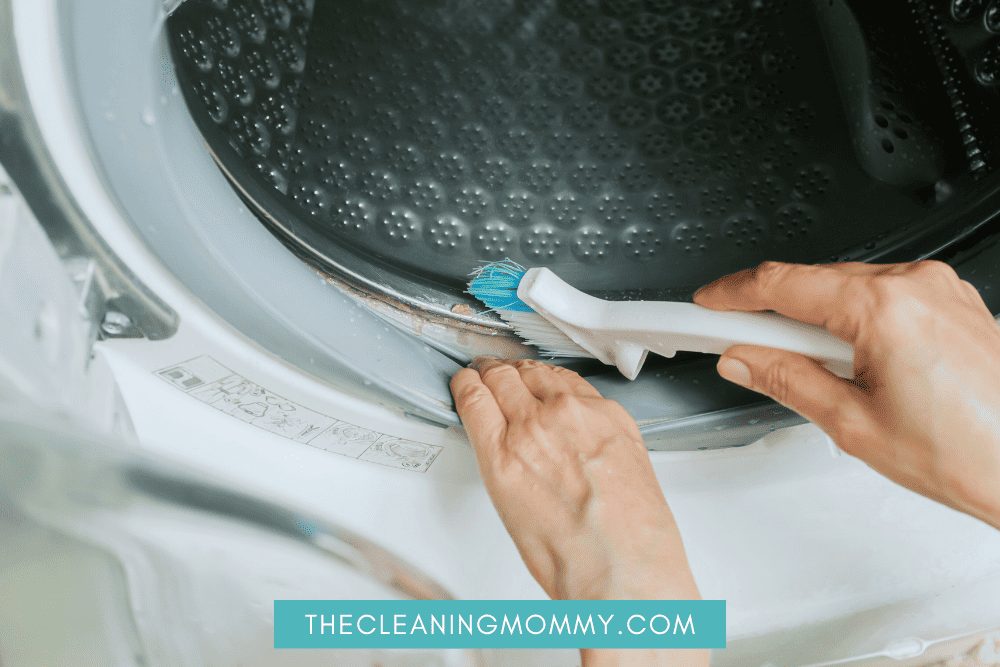
Preventative Measures for a Fresh-Smelling Washing Machine
Now that your washing machine smells fresh and clean, taking preventative measures to maintain this freshness becomes crucial. Here are some tips to help you:
- Use the correct amount of detergent in your laundry routine. Don’t overpour because your clothes are badly stained!
- Perform regular maintenance, such as cleaning the drum and filter. Front loaders are especially vulnerable and need to be cleaned regularly.
- Air out your machine by leaving the door open after each use.
By following these steps, you can ensure a fresh-smelling laundry experience every time. Regular maintenance is key to keeping your washing machine smelling fresh.
Proper Detergent Usage
Preventing detergent buildup and residue in your washing machine hinges on using the correct amount of detergent. High-efficiency washers, for example, require only 1 tablespoon of detergent per load, whereas standard washers require approximately 2 tablespoons of 2X detergent.
Overloading your machine with detergent can lead to a buildup of soap scum and unpleasant odors.
To ensure you’re using the correct amount of detergent, consult your washing machine’s manual for guidance.
I would also consider using detergents specifically designed for your machine type, such as high-efficiency detergents for high-efficiency machines. This will help prevent detergent buildup and keep your washing machine smelling fresh.
Regular Maintenance
Regular maintenance is another key factor in maintaining a fresh-smelling washing machine. As discussed earlier, cleaning the dispensers, running a hot cycle with vinegar, and scrubbing the drum and seal can help eliminate odors and prevent mold and mildew growth.
Performing these tasks regularly will ensure your washing machine remains in working order and free of unpleasant smells.
Additionally, consider conducting a service wash cycle, also known as a maintenance wash or self-cleaning cycle, approximately once per month. This cycle uses hot water to sanitize the interior of your washing machine and helps prevent odors from recurring. By doing this, you will be maintaining your washing machine regularly.
Air It Out
Lastly, airing out your washing machine is a simple yet effective preventative measure for maintaining its freshness. By leaving the washing machine door open when not in use, you allow air to circulate, preventing mold and mildew growth.
Regular air circulation helps keep your washing machine smelling fresh and ready for your next laundry load.
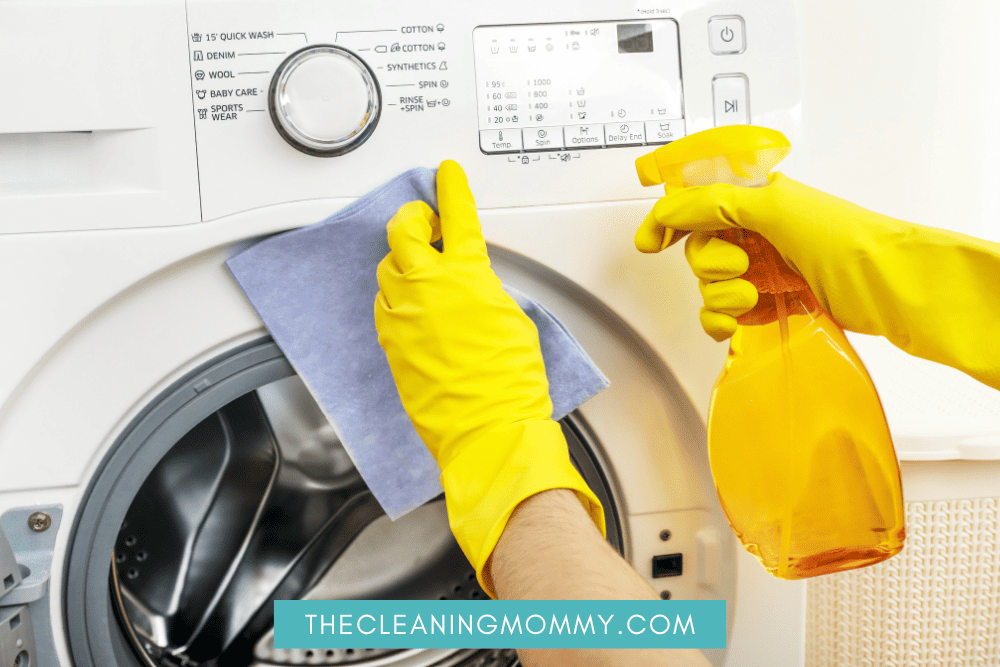
Alternative Cleaning Solutions for Stubborn Odors
If you’ve followed the steps above and still struggle with stubborn odors, don’t worry – there are alternative cleaning solutions available. These include Affresh washing machine cleaner and bleach treatment, both of which can help tackle persistent smells in your washing machine.
Affresh Washing Machine Cleaner
Affresh is a washing machine cleaner designed to effectively clean the interiors of washing machines and help remove mineral stains and odors caused by hard water. It’s a convenient solution for those who live in areas with hard water or have persistent washing machine odors.
Yet, be aware that Affresh contains boric acid, a known skin irritant, and is an alternative to using baking soda. Exercise caution when using this product and follow the manufacturer’s instructions carefully.
Adding Affresh washing machine cleaner to your regular maintenance routine can help maintain a fresh-smelling washing machine and tackle stubborn odors that regular cleaning might not eliminate. I use mine at the begining of each month!
Bleach Treatment
A chlorine bleach treatment can be an effective solution for killing mold and mildew in your washing machine.
To use bleach correctly, follow these steps:
- Add 2 cups of bleach to a front load washer and 4 cups of bleach to a top load machine.
- Run a hot water cycle and let the tub fill up, let the bleach sit in the machine for 30 minutes before starting the hot water wash cycle.
- After the treatment, run a regular wash cycle to rinse out the bleach.
After the bleach treatment, it’s crucial to run two rinse cycles to ensure all traces of bleach are removed from your washing machine. This will prevent any residual bleach from damaging your clothes during future washes. This treatment can help reduce odors and bacteria in your machine, leaving it smelling fresh and clean.

Get Rid of Washing Machine Smells Summary
In conclusion, washing machine smells can be a frustrating problem that affects the freshness of your laundry. By identifying the cause of your smelly washing machine – mold and mildew, detergent buildup, and trapped debris – and following the steps to eliminate them, you can restore your washing machine to its fresh-smelling state.
Don’t let a smelly washing machine ruin your laundry room experience. Take action by implementing proper detergent usage, regular maintenance, and airing out your machine. With these preventative measures in place, you can enjoy the satisfying scent of fresh laundry every time.
Frequently Asked Questions
How do I get rid of my smelly washing machine?
To get rid of the horrible smell in your washing machine, mix one cup of vinegar with one cup of baking soda and run a cycle on the hottest setting.
You can also try adding four cups of bleach to a top-loading machine or two cups to a front-loader, running a cycle at the highest temperature and pausing it for 30 minutes before finishing the cycle.
Why does my washing machine smell bad even after cleaning?
Odors from your washing machine are usually caused by bacteria, mildew, limescale or soap scum which have built up due to cool wash cycles not generating enough heat to remove residue. Furthermore, clogged filters with trapped odors in the drum may also be contributing to the bad smell even after cleaning.
Clearing your standpipe with a drain unblocker and regularly maintaining your appliance can help prevent the smell from returning.
Is bleach or vinegar better to clean washing machine?
Vinegar is the more environmentally friendly option and it’s more affordable, making it the better choice to clean washing machines.
How to get smells out of clothes?
To get rid of smells in clothes, consider adding 1/2 cup white vinegar to the rinse cycle or 1/2 cup of baking soda to the wash cycle, using baking soda and vinegar, hanging clothes outside, checking your washing machine for a buildup of mildew, avoiding overusing detergent and not mixing dry and wet clothing.
How can I prevent mold and mildew growth in my washing machine?
If your washing machine smells bad, this is evidence of mold or mildew growth. To prevent mold and mildew growth in your washing machine, clean it regularly, use the recommended amount of detergent, and air out the machine after each cycle.
Other Cleaning Articles You May Like:
- How to easily get dry marker out of your clothes
- How to get your home smelling good (All the Time)
- Brilliant laundry hacks to help you get your laundry done faster!
- How to get mold out of your clothes
- How to get bleach out of your clothes
- How to get rid of a musty smell in your closet
- How to get a bad smell out of your fridge
- How to get your laundry smelling good

Grainne Foley
Grainne Foley is a wife and mother of 2 great kids. During her 5 years of full time RV travel, Grainne learned to become very efficient at household chores, in order to make time for family adventures. Now, back in a house, she has continued to create tools and techniques to help others lighten the load of household organization and cleaning.
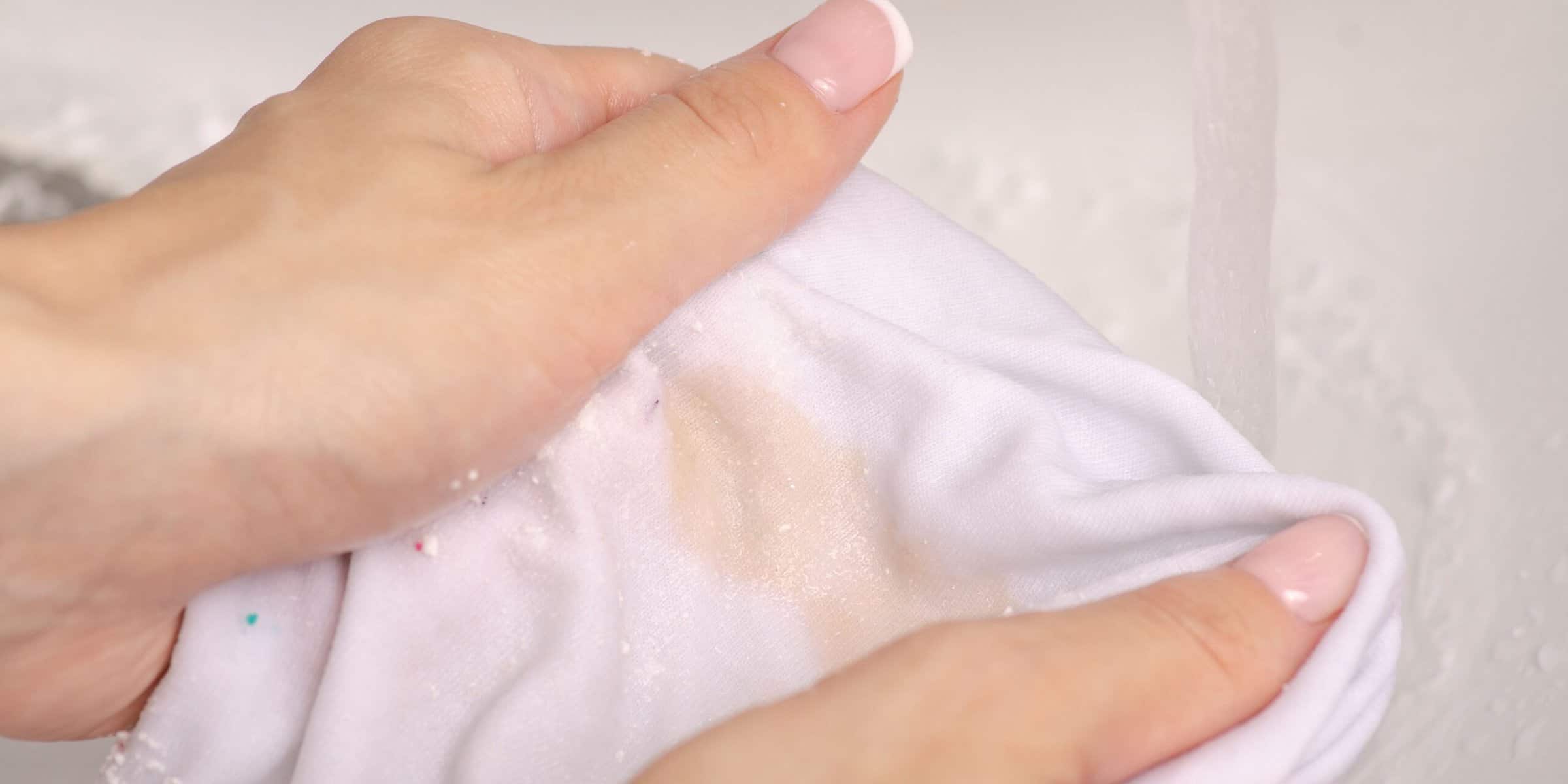


Leave a Reply